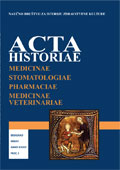Eugenics and Racial Hygiene in Theory and Political Thought of the Serbian/Yugoslav Extreme Right 1918-1944
Eugenics and Racial Hygiene in Theory and Political Thought of the Serbian/Yugoslav Extreme Right 1918-1944
Author(s): Aleksandar StojanovićSubject(s): Social history, Interwar Period (1920 - 1939), Ethnic Minorities Studies
Published by: Naučno društvo za istoriju zdravstvene kulture
Keywords: eugenics; Serbia; World War II; Yugoslavia
Summary/Abstract: This paper is mainly focused on “racial hygiene” and eugenic questions in the context of the ideology of the interwar Yugoslav extreme right and during occupation of Serbia in the World War II. The main historical sources used in this research were racial narratives and journal articles from 1920s and 1930s, together with unpublished archival records originating from the period of occupation. Analysis of sources and literature have shown that racial and eugenic themes were present in Serbian and Yugoslav political thought from the very first days of the new South Slavs state. The term “race” had several different meanings in this country, particularly regarding the “Yugoslav race”, that referred both to the cultural individuality of so-called “Yugoslav civilization”, and to the biological attributes of the Dinaric race. The ideology of (integral) Yugoslav nationalism, strongly promoted during the dictatorship of King Alexander I, encouraged racial and eugenic stances. Affirmative writings on the qualities of Dinaric race from the world-wide famous eugenic authors like Houston Stewart Chamberlain also spurred interests in racial and eugenic discussions in the Kingdom of Yugoslavia. Since the mid-1930s a number of Serbian eugenicists became close to the extreme political right, placing themselves in the first rows of ongoing ideological struggle between fascism, communism and liberal democracy. Many of them, like Dr. Svetislav Stefanović, Branimir Maleš, Dr. Stevan Z. Ivanić and others, were fascinated with the rise of Fascist Italy and Nazi Germany, and were later on involved in the collaboration with the Germans during the occupation of Serbia 1941–1944.
Journal: Acta historiae medicinae, stomatologiae, pharmaciae, medicinae veterinariae
- Issue Year: 2015
- Issue No: 34
- Page Range: 18-28
- Page Count: 11
- Language: English

